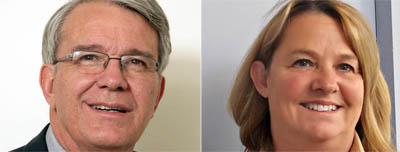Latest News Archive
Please select Category, Year, and then Month to display items
10 March 2022
|
Story Anthony Mthembu
|
Photo Unsplash
 The No Student Hungry team gearing up to start distributing food parcels to the selected students.
The No Student Hungry team gearing up to start distributing food parcels to the selected students.
The UFS is one of the many institutions of higher learning where food insecurity is an active issue. However, the
No Student Hungry Programme is one of the initiatives launched at the university to assist in fighting food insecurity at the institution.
The purpose of the programme
Since its inception in 2011, the initiative has assisted many students in acquiring a healthy meal. Additionally, the Food Environment Office also hands out food packages, so that students can continue to achieve academically. “We are trying to develop a healthy environment for students and make it easier for them to have a nice and healthy meal,” stated Annelize Visagie, who heads the Food Environment Office at the UFS. The Food Environment programme is spread out on all three campuses, each with its own facilitators. Furthermore, the programme mainly caters for students who are not funded by the National Student Financial Aid Scheme (NSFAS) but who are excelling academically. The abovementioned students apply for assistance online, and a list is then drawn up of students who receive assistance for the year.
Alternative solutions to keep the initiative running
On the Bloemfontein Campus, the No Student Hungry Programme will be catering for 200 students in the 2022 academic year, assisting them with a daily nutritious meal. Additional food parcels are also handed out to provide further assistance. “We give food parcels to the students on the list every Tuesday and Thursday at the Thakaneng Bridge,” Visagie highlighted. However, she argues that catering for the student population through this programme can be a challenge, as the demand for assistance is growing rapidly and the ability to assist is limited. The programme relies on partnerships and sponsors to assist the student body. In fact, the coordinators of the programme currently have a memorandum of understanding with Tiger Brands according to which they deliver around 100 food parcels for distribution.
In addition, the coordinators have put in place alternative measures to ensure that they can provide more food to students. “The
Kovsie Act Office, in partnership with the
Department of Sustainable Food Systems and Development, has started a food garden where healthy and nutritious produce are grown, in order to add value to the distribution,” she indicated. Although the programme can only assist to a point, students who are in desperate need of assistance are never turned away. In fact, the
Social Support Unit at Thakaneng Bridge usually assists students with food vouchers for a maximum of four days.
A commitment to teaching healthy eating habits
The programme is not only committed to curbing food insecurity, but also to ensuring that students have a healthy and balanced diet. As such, a booklet is being issued by the
Department of Nutrition and Dietetics in collaboration with the Department of Sustainable Food Systems and Development, which contains ways in which students can make a healthy meal using some of the ingredients offered in the food parcels.
“We want to teach students how to eat healthy in the cheapest way, because they don’t have a lot of money to buy expensive food products,” Visagie argued.
UFS welcomes two new deans in the faculties of Theology and Law
2014-08-04
 |
The university council has approved the appointment of two deans: Prof Fanie Snyman, at the Faculty of Theology and Prof Caroline Nicholson, at the Faculty of Law.
Both professors offer the university a wealth of knowledge and experience in research and teaching.
Prof Fanie Snyman
Prof Snyman joined the university in 1984 as a senior lecturer in the Department Old Testament. His career followed a steadfast ascent which led him to attaining the title of professor and head of department the following year. On 1 July 2013, Prof Snyman took on the additional role of acting dean of the faculty.
As dean, he set out a clear vision of academic leadership with four primary focus areas: research, teaching and learning, internationalisation and regional engagement.
He is the author of eight books and contributed to seven internationally- and twelve nationally-published books. He has published nine articles in international journals and about 60 more in accredited journals.
Prof Snyman proposes to bring staff members together to extensively rethink and reposition the faculty in terms of identity, transformation and the way forward. “We live in a complex world, characterised by uncertainty and in constant change. This calls for complex but also innovative solutions,” he says.
Prof Caroline Nicholson
Prof Caroline Nicholson was born in Scotland and came to South Africa as a young child. She obtained her BProc and LLB degrees at the University of the Witwatersrand and completed her articles of clerkship at Chernin’s in Hyde Park Corner, Johannesburg. Prof Nicholson was admitted as both an attorney and notary public of the then Supreme Court of South Africa in 1986.
In 1986 she joined the University of South Africa (UNISA ) as a lecturer and remained there until 1999. During this time she completed an LLM in Banking Law and an LLD in Comparative Conflict of Laws – focusing on international parental child abduction. During the same year she moved to the Faculty of Law at the University of Pretoria where she worked for the last fifteen years. In 2003 she completed a Postgraduate Diploma in Alternative Dispute Resolution (ADR) and has an abiding interest in ADR, especially within the Family Law context.
Prof Nicholson has produced numerous articles and research presentations on a variety of legal subjects. Her primary areas of interest are, however, legal education and child law. She is known both nationally and internationally for her research contributions.